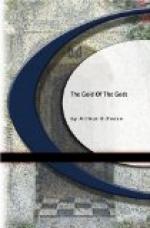“One thing more,” added the Senora, as though she had had an afterthought, “and that is about Mr. Lockwood and Mr. Whitney. Let me ask you to think it over. Suppose they have not the dagger. Then are their chances better than others? And if they have”—she paused to emphasize it—“what does that mean?”
Kennedy had turned his attention to the Senorita. It was evident that the dilemma proposed by de Moche was not without weight. She had now coloured a flaming red. The woman had struck her in a vital spot.
“Mr. Lockwood is not here to defend himself,” Inez said quietly. “I will not have him attacked by innuendo.”
She had risen. Neither the ardour of Alfonso nor the seeds of doubt of the Senora had shaken her faith. It was a test that Kennedy evidently was glad to have witnessed. For some day she might learn the truth about the foot-prints. He understood her character better. The Senora, too, had learned that if she were to bring pressure on the girl she might break her, but she would not bend.
Without another word Inez, scarcely bowing stiffly, moved out of the tea room, and we followed, leaving the mother and son there, baffled.
“I hope you will pardon me for allowing you to come here,” said Kennedy, in a low voice. “I did it because there are certain things that you ought to hear. It was in fairness to you. I would not have you delude yourself about Mr. Whitney, about—Mr. Lockwood, even. I want you to feel that, no matter what you hear or see, you can come to me and know that I will tell you the truth. It may hurt, but it will be best.”
I thought he was preparing the way for a revelation about the foot-prints, but he said nothing more.
“Oh, that woman!” she exclaimed, as if to change the subject. “I do not know, I cannot say, why she affects me so. I saw a change in my father, when he knew her. I have told you how he was, how sometimes I thought he was mad. Did you notice a change in Mr. Whitney, or haven’t you known him long enough? And lately I have fancied that I see the same sort of change beginning in Mr. Lockwood. At times they become so excited, their eyes seem staring, as if some fever were wasting them away. Father seemed to see strange visions, and hear voices, was worse when he was alone than when he was in a crowd. Oh, what is it? I could think of nothing else, not even what she was saying, all the time I was with her.”
“Then you fear that in some way she may be connected with these strange changes?” asked Kennedy.
“I don’t know,” she temporized; but the tone of her answer was sufficient to convey the impression that in her heart she did suspect something, she knew not what.
“Oh, Professor Kennedy,” she cried finally, “can’t you see it? Sometimes—when she looks out of those eyes of hers—she almost makes people do as she pleases.”
We had come to the taxicab stand before the hotel, and Kennedy had already beckoned to a cab to take her home.




